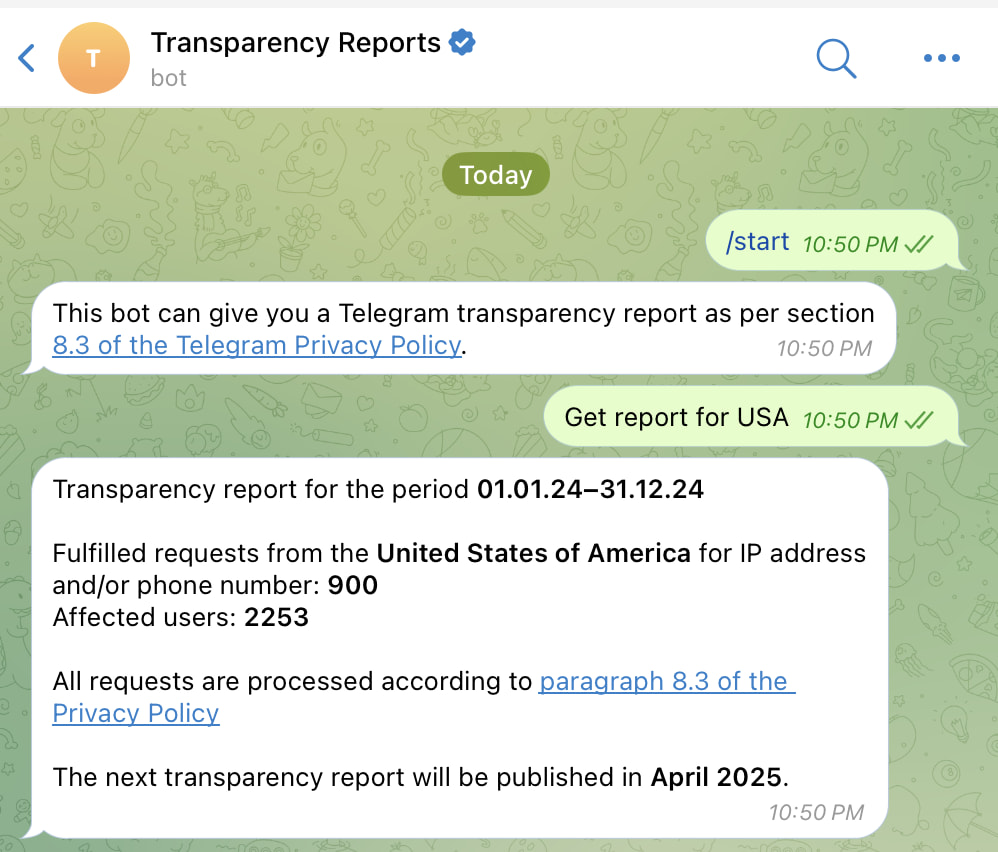
Telegram, the popular yet controversial messaging app, has significantly increased its compliance with law enforcement data requests, fulfilling 900 requests from U.S. authorities in 2024. This marks a massive spike in cooperation compared to earlier periods, with data provided affecting 2,253 users, according to newly released transparency figures accessed via Telegram's Transparency Reports bot.
The data highlights a dramatic increase in law enforcement cooperation during the last quarter of 2024, following a pivotal policy shift. Between January and September 2024, Telegram fulfilled only 14 requests from U.S. authorities, affecting 108 users. However, between October and December 2024 alone, the number of fulfilled requests soared, driving the total to 900 requests by year-end.

This shift in Telegram's stance comes in the wake of the arrest of its CEO, Pavel Durov, in France in August 2024. Durov's detention stemmed from the company's reluctance to cooperate in a child abuse investigation, which heightened regulatory scrutiny of the platform. In response, Telegram amended its privacy policy in September 2024, committing to provide user data such as IP addresses and phone numbers to law enforcement agencies upon valid legal requests. Previously, Telegram only disclosed user data in cases involving terrorism and claimed no such disclosures had been made.
Telegram still a cybercrime hotspot
Telegram's decision to cooperate with law enforcement sparked an immediate backlash, especially among its extensive cybercrime community. Known for its widespread use by hackers, scammers, and other criminals, Telegram has long been perceived as a haven for illicit activity due to its robust channel and group features and its historic reputation for resisting government data requests.
Following the policy change, many cybercriminal groups publicly declared their intent to leave the platform, exploring alternatives like Signal, Discord, and decentralized communication tools such as Tox and Matrix. However, data suggests that these declarations have not led to significant migration.
For instance, KELA, a cybersecurity intelligence firm, reported in December 2024 that Telegram continues to dominate the cybercrime landscape. Over 246,000 links to Telegram channels are shared monthly in cybercrime communities, compared to just 682 links for Signal and Discord combined. Despite some initial movement to alternatives, most groups have either resumed or maintained their activity on Telegram.
Shift in compliance and outlook
Telegram's latest transparency data underscores the magnitude of its compliance shift. While the company previously resisted law enforcement requests, the events following Durov's arrest have forced a reevaluation of its privacy-first principles. The newly fulfilled requests from U.S. authorities reflect a broader trend of increasing government pressure on tech companies to cooperate with investigations involving criminal activity.
Critics argue that Telegram's updated privacy policy undermines the app's core appeal for privacy-conscious users. Yet, for others, the platform's extensive network, usability, and group features outweigh concerns about its revised policies. As a result, Telegram has retained its position as a central hub for both legitimate and illicit activities.
Users concerned about privacy are recommended to follow these precautions:
- Telegram's default chats are not end-to-end encrypted. Secret Chats offer better protection.
- Avoid linking your Telegram account to a phone number tied to your identity.
- Explore platforms like Signal for sensitive communications, as they offer default end-to-end encryption.
Telegram's next transparency report is expected to be released in April 2025, which may provide further insights into Telegram's evolving approach to user data and law enforcement collaboration.







Telegram
I am trying to get back on telegram I cant
Hi
hi Alex, l have a question: my telegram Is registered with aa telephone number not tiyed with identity but my, however, telegram app pick up the smartphone ID and its IP address as well as the SIM (telephone) number?
this Is important particularly IF therd are other sensitive apps pres by on the same device such as e-mail or home banking.
thank you very much!
thank you!
yes